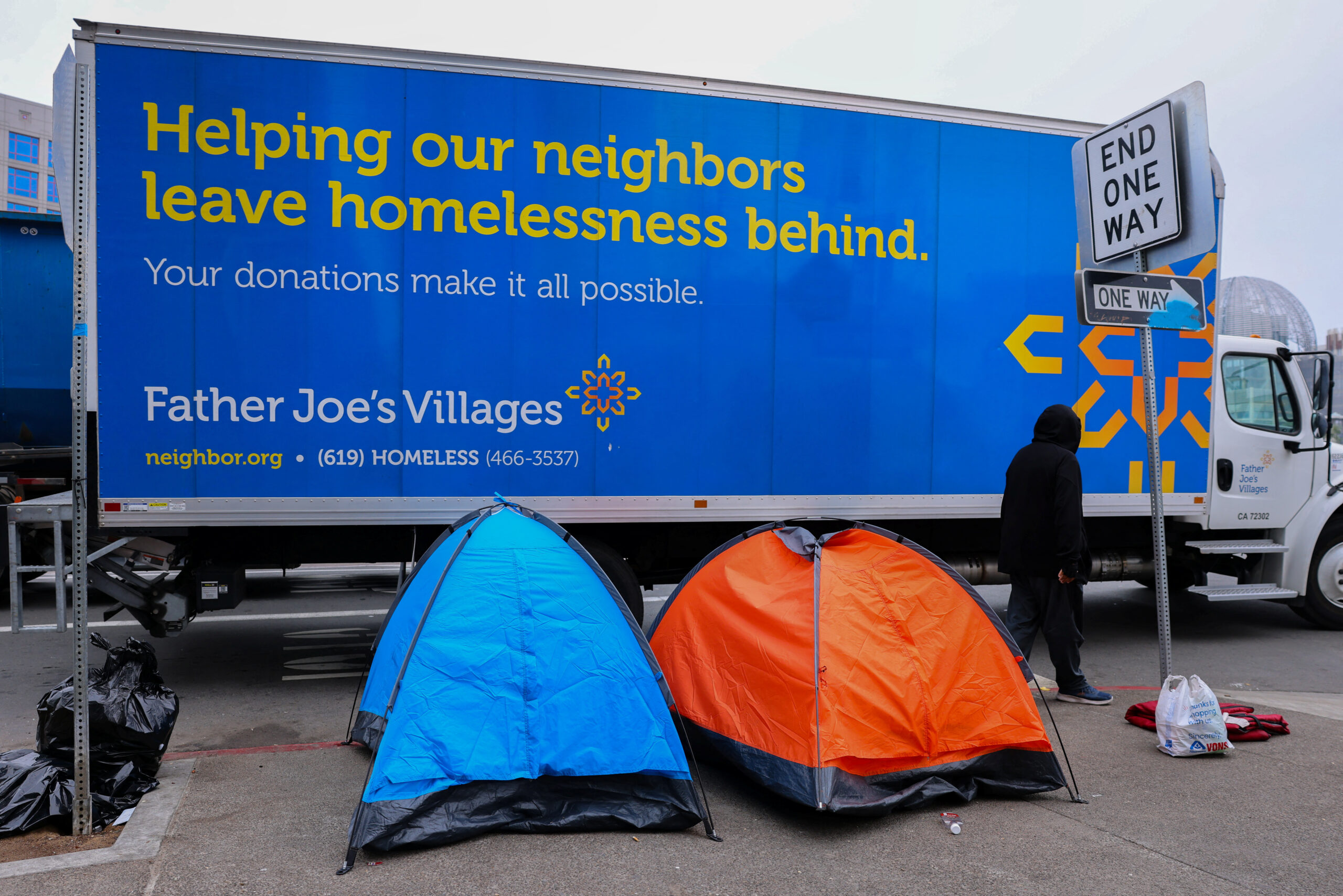
Homeless tents are set up on a sidewalk in downtown San Diego, California, U.S., February 26, 2024. REUTERS
SAN DIEGO — Seven months into a crackdown by the city of San Diego on homeless encampments, many of the tents that once lined downtown sidewalks are gone.
Now two California state senators – a Republican and a Democrat – have joined forces to propose a statewide version of San Diego’s ordinance, which allows police to roust many homeless people even when shelter is unavailable.
But advocates for homeless people said the enforcement strategy has merely chased the homeless onto riverbanks and other unseen places, as the number of shelter beds still fails to meet demand.
READ: California initiative to tackle homelessness feared would worsen problem
The debate reflects growing urgency, as polls show homelessness and affordable housing as two of the most important issues to California voters. The state has spent more than $20 billion on housing and homelessness programs since the 2018-19 fiscal year but still has more than 180,000 homeless people.
The U.S. Supreme Court is set to weigh in. The justices are scheduled to hear arguments on April 22 in a case from Oregon that may determine the legality of enforcing anti-camping laws and other regulations affecting homeless people when there is nowhere for them to go.
The justices will hear an appeal by the city of Grants Pass in southern Oregon of a lower court’s ruling that found that local ordinances that outlawed camping on sidewalks, streets, parks or other public places violate the U.S. Constitution’s Eighth Amendment prohibition against “cruel and unusual” punishment. A ruling is expected by the end of June.
Shopping carts and duffle bags
Homeless people still congregate in downtown San Diego, pushing their possessions in shopping carts or sitting on duffle bags, awaiting city services such as referrals for shelter, food or clothing, or mental health and substance abuse treatment. The city has about 6,500 homeless people, according to a census conducted a year ago. About half found some kind of roof, but that still left 3,285 in the street.
Homeless advocate Michael McConnell said a game of Whac-A-Mole has emerged, with politicians who failed to provide affordable housing now resorting to police force.
READ: California’s famed Venice Beach grapples with homeless problem
“It hasn’t solved homelessness, it’s just scattered homelessness,” said McConnell, a former vice chair of the board of the Regional Task Force on Homelessness, an organization that administers public funding for shelters and other services.
McConnell sold his coin shop business in 2018 to dedicate his time to the issue.
San Diego in June 2023 passed the Unsafe Camping Ordinance with a 5-4 vote on a city council made up entirely of Democrats, allowing police to enforce camping laws at transit hubs, parks or within two blocks of a school or shelter, regardless of whether beds are available.
It is an example of bipartisan agreement to prioritize enforcement, despite a consensus among government officials and advocates that a better solution is more affordable housing.
Democrats including California Governor Gavin Newsom had asked the conservative-majority Supreme Court to take up the Oregon case. In a brief, Newsom said rulings by the San Francisco-based 9th U.S. Circuit Court of Appeals against measures in Grants Pass and Boise, Idaho, have “paralyzed” efforts to address unsafe and unsanitary encampments.
‘Two left shoes’
In the meantime, San Diego is enforcing its law. Other municipalities have faced civil lawsuits challenging camping bans by plaintiffs, citing the Grants Pass and Boise rulings.
A San Diego homeless man who identified himself as Brother Shine said that as a result of the city’s enforcement efforts he is constantly being asked to move along, even if just around the corner.
“That’s as wrong as two left shoes. It doesn’t make a lick of sense to Brother Shine,” he said shortly after an encounter with two uniformed police officers.
A monthly survey by a business alliance shows the number of homeless people in downtown San Diego peaked at 2,104 in May 2023, before the law took effect on July 31. By December the number had fallen to 846, though it picked up to 1,019 in January, according to the survey.
Advocate McConnell said many people are simply pushed outside the boundaries of where the survey is taken.
San Diego Mayor Todd Gloria, a Democrat, acknowledged that some homeless people are just relocating, but said the city was putting more in contact with services.
Homeless people move their belongings to the side of a freeway on land under state jurisdiction, after being evicted from a downtown location along side a city street, in San Diego, California, U.S., February 26, 2024. REUTERS
The city funds 1,856 shelter beds, nearly double the number when he took office in 2021, Gloria said. In addition, last year the city opened 533 tents for singles or couples at two safe sleeping sites, plus 233 safe parking places where people can sleep in their cars, according to the mayor’s office.
“I’m an evangelist for housing,” Gloria told Reuters, saying his goal was to add another 1,000 shelter beds in 2024 and further streamline bureaucracy to expedite the construction of permanent housing.
Republican state Senator Brian Jones introduced the homelessness bill, which was co-authored by Democrat Catherine Blakespear.
Jones called the proposal one step toward a solution.
“We want to get people off the streets and into permanent housing,” Jones said.
Blakespear said dealing with homelessness should be treated as an emergency while long-term solutions are pursued.
“I want to be able to walk on the sidewalk,” Blakespear said. “I live here in Sacramento, about seven blocks from the Capitol, and I don’t always feel comfortable walking home.”